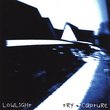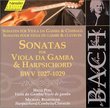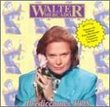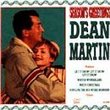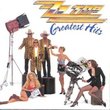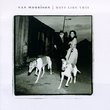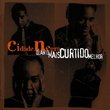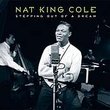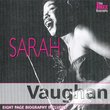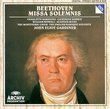| All Artists: Wolfgang Amadeus Mozart, René Jacobs, Freibruger Barockorchester, Johannes Weisser, Lorenzo Regazzo, Alexandrina Pendatchanska, Olga Pasichnyk, Kenneth Tarver, RIAS Kammerchor Sunhae Im , Alessandro Guerzoni Nikolay Borchev Title: Don Giovanni Members Wishing: 1 Total Copies: 0 Label: Harmonia Mundi (France) Original Release Date: 1/1/2007 Re-Release Date: 10/9/2007 Album Type: Import, Box set Genre: Classical Styles: Opera & Classical Vocal, Historical Periods, Baroque (c.1600-1750), Classical (c.1770-1830) Number of Discs: 3 SwapaCD Credits: 3 UPC: 794881859924 |
Search - Wolfgang Amadeus Mozart, René Jacobs, Freibruger Barockorchester :: Don Giovanni
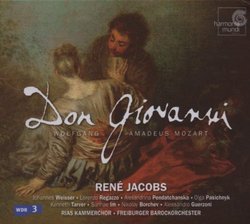 | Wolfgang Amadeus Mozart, René Jacobs, Freibruger Barockorchester Don Giovanni Genre: Classical
|
Larger Image |
CD DetailsSimilar CDs
Similarly Requested CDs
|
CD ReviewsMuch-Needed Freshness for an Old Classic R. Gerard | Pennsylvania USA | 10/09/2007 (5 out of 5 stars) "I was blown away by Rene Jacob's Cosi Fan Tutte. His follow-up rendition of Le Nozze di Figaro was also a fresh, fun, lively, and engaging, and forced listeners to this old classic to re-think the way we hear this jewel of standard operatic repertoire. Jacobs did it again with Mozart's oft-neglected masterpiece, La Clemenza di Tito, by breathing some serious life into this serious work. And today (9 October 2007) his long-awaited Don Giovanni has been released in the states, and far exceeds my expectations. Like his three other recordings of Mozart's operas, Rene Jacobs is making us re-think what we consider to be "Mozartian." Years ago, Maria Callas criticized the habit performers have of singing and playing Mozart as though they were on their "tip-toes." Finally, Rene Jacobs gives us a reading that does not beat-around-the-bush with the mannered "tip-toed" singing and playing we are used to. Like his other Mozart releases for the HM label, this one is dramatic: sometimes tender, sometimes bombastic, sometimes hilarious, sometimes austere and horrifying, full of that 18th century "Sturm und Drang" that Mozart was famed for. Indeed, Rene Jacobs has said that in a recording his singers "must act using only their voice." And this is what they do. The result is 3-CDs full of music where you will never find yourself skipping over any recitatives. His characters are fully developed and fully acted, with the instrumental ensemble (especially the often overlooked fortepiano continuo in the dry recitatives) providing the perfect support for the action. This is true musical drama the Jacobs gives us. Much credit goes to Jacob's casting decisions. I cannot begin to express how impressed I am with Alexandrina Pendatchanska in the role of Donna Elvira. After hearing her hot-red-blooded Vitellia in La Clemenza di Tito, I thought she would be perfect for the vengeful Donna Elvira, and here she is. I am excited to finally hear an Elvira who truly sounds as though she is vacillating between loving remorse, and vengeful, murderous hatred for Don Giovanni. Sunhae Im is a charming soprano soubrette, perfectly appropriate for the role of Zerlina. She is girlish, playful, and naive, and completely believable in her role. She gives a devilish laugh at the end of her "torture duet" with Leporello in the second act, adding a kind of sassiness to her character. Her screams during the Finale in the first act make the action seem more real and unrestrained. Detractors from Johannes Weisser's Don Giovanni usually find issues with his somewhat lighter timbre than what we are used to hearing. I'd say to these detractors to do a little historical/musicological research on the voices Mozart actually wrote for. Jacobs, if he wanted to create music the way Mozart would have heard it, was correct/judicious in choosing Weisser for the role. The original libretto (as well as many of the preexisting plays/dramas DaPonte based his libretto on) calls for Don Giovanni to be a YOUNG and licentious nobleman, NOT the aging and libidinous "senex amans" we are used to seeing. It is also true that the ORIGINAL Don Giovanni (Luigi Bassi in 1787) that Mozart wrote for was only TWENTY-ONE years old when he premiered the role, as compared to Johannes Weisser who is likewise still in his twenties. Weisser is great vocal actor, full of the suave-ness the Don needs. When his character is dragged down to Hell at the end of the opera, he gives THE most terrifying, hair-rasing howl I've heard on record. Lorenzo Regazzo is a terrific Leporello. He displays the apropos oafishness and "buffo" that his character has always needed. But like all of Rene Jacob's Mozart recordings, one of the most striking features is the secco recitatives. The fortepianist created delightful commentary on the action by improvising his lines, in the manner Mozart and other composers/conductors/continuists of this time would have done. In terms of interpretation, Rene Jacobs has never been one to follow the mainstream. This recording is no exception. Be prepared to hear some sudden tempo changes. These are, however, an acquired taste that get better and more "listenable" with subsequent hearings. In actuality, these tempo changes make sense when one takes into account the words in DaPonte's libretto. Be prepared to hear a different version of Don Giovanni we are used to hearing. Indeed, the version we usually hear or see today is more like a pastiche of two completely versions Mozart used: one for Vienna, and one for Prague. The version recorded by Jacobs is the Vienna version, in which an entire middle section of the second act (as well as a few other parts here and there) is completely re-written. This gives us, as listeners, a more exact reference as to what Mozart's first Viennese audience would have heard back in the late 1780s. Rene Jacobs, however, realizing that this decision would mean scrapping entire arias, some of them favorites of operatic repertoire, has included these Prague arias in an Appendix on the 3rd CD. So fear not- this recording is complete (if not more complete than other recordings out there). I tend to now judge all my other Mozart recordings to the ones Jacobs has released for Harmonia Mundi. It may be because Jacobs has seemed to rehabilitate these old favorites so successfully that I feel as though I am sitting in an 18th century opera house witnessing Mozart himself direct. I truly foresee myself making this Don Giovanni the new standard for which I judge future performances of this classic. Do not hesitate to purchase this one!!! (My only hope is that Jacobs will be good enough to give us an Ideomeneo, Die Entfuehrung aus dem Serail, or Die Zauberfloete sometime soon!)" Jacobs Does It Again - Mozart would be Proud! Brad J. | St. Paul, MN | 11/04/2007 (5 out of 5 stars) "I too was once a huge fan of the Giulini recording, finding that it could do no wrong. Apparently I am now wrong. This new Jacobs edition of Don Giovanni has been on my wish list for a long time. His Figaro is my absolute favorite recording, and his Cosi was my first. I've since listened to a few others, but his conducting rings true and trumps every other version. This Don is no exception. The recitatives, as one reviewer remarked, do sparkle equally with the arias, of which every one is a masterwork. This is because Rene Jacobs instructs his performers to "act" despite being in a recording studio. You physically see the action in your mind, and it really makes the opera accessible to more people (I've used specific arias to get my family into opera--the Catalogue aria, the first act finale is a must, and, of course, from Non mi dir to the Commendatore scene work best). Also, the choice of a younger Don is supported by Jacobs on the grounds that Mozart himself used a singer in his early twenties. Besides making it more believable that that voice could seduce over 1,003 women (in Spain alone), it also brings the added ingenuity of the work's rejuvinating character to life. This is truly the best "Don Giovanni" on record. Others are fine, but this one is going to become a staple, an industry standard, for Giovanni performances. Also, the Commendatore scene is truly frightening--other recordings seem to mess it up by tempo, including the Giulini--which this scene requires to make the opera truly come to fruition. Lastly, Jacobs combines aspects of the Prague and Vienna performances of the opera--Mozart revised parts of it for the later and snobbier Vienna premiere--to make it truly different. But don't worry, the parts he left out are added in the end in an appendix section. In the words of Joseph II, emperor of Austria at the opera's premiere, "the opera is not food for the teeth of my Viennese." Mozart's reply was that he "should give them time to chew on it." With this recording, you don't need repeated listenings to convince you that it's worth all of the praise history has bestowed on it. A reinvigorating classic that gets five stars easily. Don't hesitate to add it to your collection! Also, it is often helpful to get a good product decription: It comes in a beautiful hard case, which folds out to unveil the 3 discs as well as a thick booklet. It contains the libretto and an essay written by Rene Jacobs on his interpretation. There is also a discographie of Jacobs work. " Jacobs triumphs again with Don Giovanni Abel | Hong Kong | 11/07/2007 (5 out of 5 stars) "Having heard Rene Jacob's mind-refreshing La Clemenza di Tito last year, I could hardly wait for his 2007 release of Mozart's Don Giovanni, an opera that has been my favourite since I learnt to love opera.
Many have already commented on the overall strength of this recording. I would only share my marvel on Jacob's choice of the cast: there is virtually not one single weak link in the entire cast. Some singer surfaced over the rest - young Johannes Weisser in the title role is a real surprise for a 27 year-old. The three solo arias are not merely well sung, but novel and give the character a brand new dimension from the classic one set half a century ago by the great lyrical bass Cesare Siepi, and who has not been surpassed since. The Leporello indeed sounds peasant-like. None would ever mix him up with his boss, as in Giulini's all-time famous version. The only tenor Kenneth Tarver is a suave, courtier-like figure but with sufficient charisma to become the heroine's champion. Tarver in all respects equalled Alva in Giulini's version. The real surprises come from the ladies - Olga Pasichnyk is a very satisfying Donna Anna. She isn't shrill or loud, but is full-voiced and pressing in her entrance, and dramatically effective in all the rest. Zerlina is a typical chirpy soubrette sung with charm and expressiveness that is seldom found in soubrettes. Sunhae Im rightfully claims to be the best Zerlina of her era. The only slight disappointment in the trio of sopranos comes surprisingly from Alexandrina Pendatchanska, the singer who stood out reigning over the entire cast in Jacob's La Clemenza di Tito last year. Donna Elvira sounds tired - yea, tired, right from the first aria. One misses the fiery outbursts of Elisabeth Schwarzkopf in the Giulini and Furtwangler versions. Perhaps Schwarzkopf's Donna Elvira is to be preserved in memories of opera lovers ad infinitum. Finally, I must congratulate Harmonica Mundi in producing such ear-pleasing sonics in this all-time favourite opera." |

 Track Listings (24) - Disc #1
Track Listings (24) - Disc #1